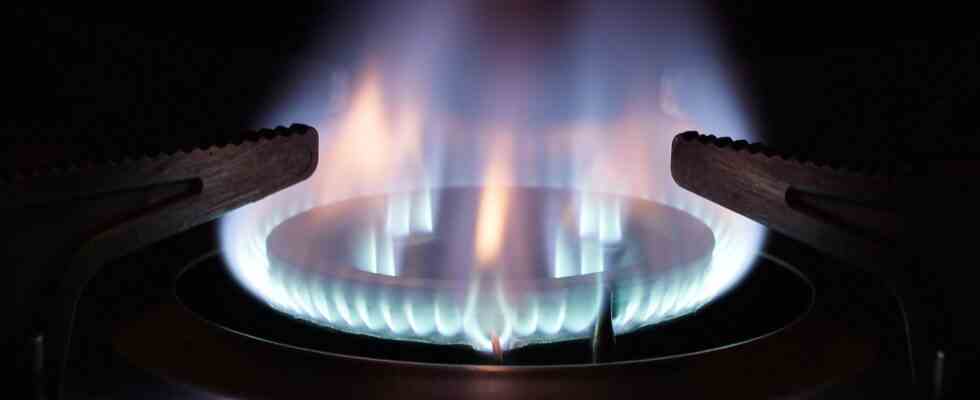background
Status: 02/14/2023 08:20 a.m
After reaching record highs, the gas price has fallen significantly again. Is it worth switching providers again now? The fact is: the tariff jungle remains confusing.
The gas price for private customers has risen by an average of 87 percent within a year. This shows an evaluation by the Federation of Consumer Organizations (vzbv) for the Hessian radio. While prices for basic services in Düsseldorf rose by 26 percent from January 2022 to January 2023, gas in Munich rose by 175 percent. The association analyzes prices in the fourteen most populous cities in Germany.
The evaluation shows that it can be worthwhile for private customers to switch gas suppliers. “In the majority of the cities surveyed, the prices for the basic service were again well above the prices for the special contracts,” says Sabine Lund from the vzbv.
Comparison portals do not necessarily deliver the cheapest offer
In the case of comparisons, the prices shown by gas suppliers are taken into account. The state gas price brake is not included. It will not come until March, but will then limit the gas price to twelve cents per kilowatt hour for one year retrospectively from January. This applies to eighty percent of annual consumption. Private customers are only charged the full price for the remaining twenty percent.
Anyone looking for an overview of gas offers regularly clicks on comparison portals. Even if the data there is basically correct – it is not certain that really all cheap providers are listed. According to the vzbv, comparison portals on the Internet work like brokers. “Sometimes they only list selected companies and collect a commission for every brokered contract. The platforms are therefore not acting altruistically, and sometimes not neutrally either.” A look at evaluations by the independent and reputable Stiftung Warentest sometimes helps. For just under fifteen euros you can access all tests for a month.
Confusing additional terms and conditions for tariffs
Price comparisons between different providers are made more difficult by additional conditions that are sometimes difficult to understand. Instead of saying clearly what a kilowatt hour of gas costs for this or that annual consumption in the city or town, exchange bonuses, credits and graduated prices are offered – which are the same in the first six months and then different again.
Suppliers like to lure customers with low monthly down payments. Although they are related to the price, they do not always represent it seriously. Gas price brakes and confusing additional conditions can also be calculated for private individuals using basic arithmetic.
Some low-cost providers stopped deliveries
In Germany, nobody should be left without a gas and electricity supplier. The Energy Industry Act obliges the largest local provider to make everyone an acceptable offer. This is the so-called basic service, which the municipal utilities regularly take care of. Customers also have the opportunity to choose a supplier on the market. Municipal utilities, intermediaries and large companies compete here.
Last year, some low-cost providers ran out of steam. They had agreed prices with their private customers that could no longer be maintained in view of the drastically rising purchasing costs – or that they no longer wanted to maintain. Some special contract providers increased their prices so that they became more expensive than basic providers. Others stopped the delivery without further ado. Some households suddenly found themselves without a gas supplier.
Those who remorsefully returned to the basic supplier had to realize that significantly higher prices were being charged – also higher prices than the old customers of the basic supplier had to pay. From November, the Federal Network Agency prohibited the suppliers in the basic service from distinguishing between new and existing customers in terms of prices. The occasionally bitter individual cases show an economic principle: whoever does business with an unreliable partner takes a risk.
The calculation of the municipal works
Compared to the extremes of the previous year, the gas price has now fallen. Overall consumption is lower than expected, storage facilities are full and new supply routes have been paved. Although the previous low price level is a long way off, gas suppliers can often offer their special contracts more cheaply than suppliers in the basic supply.
Many public utilities still rely on their local customer base, which by and large shows little interest in switching providers. Municipal utilities with more than reasonable gas prices can pay their management and staff high. In order to offset the high energy gains of public utilities, city administrations are happy to place expensive swimming pools and loss-making bus companies in the care of their public utilities.
Switching from one provider of the basic service to another supplier is possible at any time without any problems. In most cases, the new supplier takes care of the formalities. Anyone who concludes a contract at a special rate is bound to the agreed term.
It is important to consider whether a fixed or a flexible price is desired. A fixed price means security for the entire term of the contract. With a flexible price, you can benefit from reductions in the gas market. But of course there is also the risk that the supplier’s purchase prices will rise and that he will pass this on to his customers.

